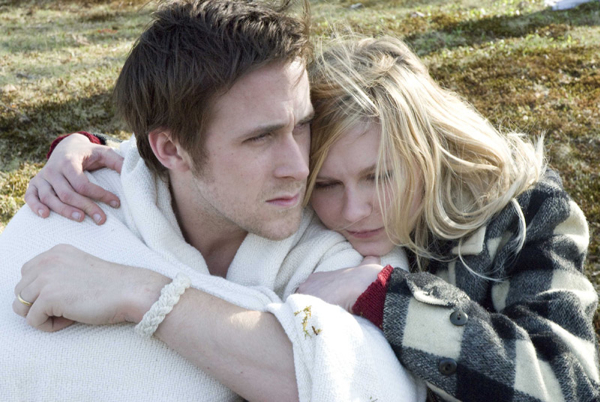Movie review by Greg Carlson
Filmmaker Andrew Jarecki, whose excellent 2003 documentary “Capturing the Friedmans” examined a family destroyed by sexual abuse and child pornography, fails to translate his sharp observational acuity to drama in “All Good Things,” a fictionalized account of Robert Durst, wealthy heir to a family fortune in Manhattan real estate and prime suspect in his wife’s still unsolved 1982 disappearance. Durst, renamed David Marks and played by Ryan Gosling in the movie, was also questioned in the execution-style killing of a longtime friend and eventually served time for lesser charges following the murder of a boarding house neighbor in Texas.
Durst’s proximity to three grim cases included tabloid headline-baiting details: he posed in wigs and make-up as a woman named Dorothy and openly admitted to dismembering Morris Black (called Malvern Bump and played by an underutilized Philip Baker Hall) with a hacksaw. Weirder still, Durst – a free man today, spoke favorably about Jarecki’s film in a November 24, 2010 “New York Times” article by Charles V. Bagli and Kevin Flynn, reporters who had covered the Durst case beginning in 1999.
Lurching through decades of domestic dysfunction traced all the way back to Marks witnessing his mother’s suicide, “All Good Things” oversimplifies the relationship between David and his father Sanford (Frank Langella), a ghoulish presence constantly pressuring his son to do his bidding. When David meets the winsome Katie (Kirsten Dunst) and retreats with her to Vermont to open the health food store that provides the film with its title, Sanford tightens his grip, bullying David into the family business back in NYC. Dunst’s performance as Katie is one of the few bright spots in the movie, principally because viewers can relate to her confusion and frustration as David begins to lose his temper and eventually his mind. As soon as she exits the movie, so too does the viewer’s interest.
Vague when it needs to be concrete and detached when it should show concern, “All Good Things” frustratingly holds Marks at a distance too great for Gosling to make him a thoroughly human character. Blunt pronouncements about David’s childhood trauma are repeated to explain the character’s warped and wounded social maladjustments, but the filmmaker shares only the most superficial aspects of David and Katie’s unraveling marriage. When David’s inability to cope with his demons reaches a fever pitch, so does Rob Simonsen’s bombastic score, a dreadfully obvious wreck alleviated only by the presence of some period pop, including a trio of well-placed Steely Dan cuts.
With the exception of Daniel Patrick Moynihan, seen brushing off possible evidence of the Marks/Durst family’s seedy corruption, screenwriters Marcus Hinchey and Marc Smerling rename all the real life models, granting a greater degree of freedom and speculation than might have been used if the original missing persons case was closed. Theories are offered for all kinds of dirty deeds, ranging from contract killing to blackmail to a decoy imposter used to establish an alibi. The result is messy guesswork that lacks all the intrigue and spooky ambiguity displayed in “Capturing the Friedmans.”
